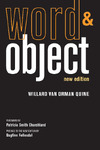| dc.contributor.author | Quinel, Willard van Orman | en_US |
| dc.contributor.author | Churchland, Patricia Smith | en_US |
| dc.contributor.author | Follesdal, Dagfinn | en_US |
| dc.date.accessioned | 2020-08-03T08:48:14Z | |
| dc.date.available | 2020-08-03T08:48:14Z | |
| dc.date.issued | 2013 | en_US |
| dc.identifier.isbn | 978-0-262-51831-4 | en_US |
| dc.identifier.isbn | 9780262312790 | en_US |
| dc.identifier.isbn | 9781299133716 | en_US |
| dc.identifier.other | HPU2164249 | en_US |
| dc.identifier.uri | https://lib.hpu.edu.vn/handle/123456789/33383 | |
| dc.description.abstract | Willard Van Orman Quine begins this influential work by declaring, "Language is a social art. In acquiring it we have to depend entirely on intersubjectively available cues as to what to say and when." As Patricia Smith Churchland notes in her foreword to this new edition, with Word and Object Quine challenged the tradition of conceptual analysis as a way of advancing knowledge. The book signaled twentieth-century philosophy's turn away from metaphysics and what Churchland calls the "phony precision" of conceptual analysis. | en_US |
| dc.format.extent | 309p. | en_US |
| dc.format.mimetype | application/pdf | |
| dc.language.iso | en | en_US |
| dc.publisher | MIT Press | en_US |
| dc.subject | Semantics | en_US |
| dc.subject | Language | en_US |
| dc.subject | Epistemology | en_US |
| dc.title | Word and object | en_US |
| dc.type | Book | en_US |
| dc.size | 1,74 MB | en_US |
| dc.department | Sociology | en_US |

